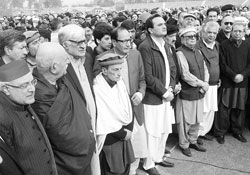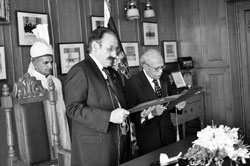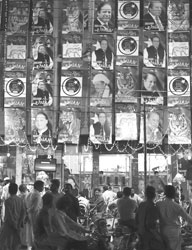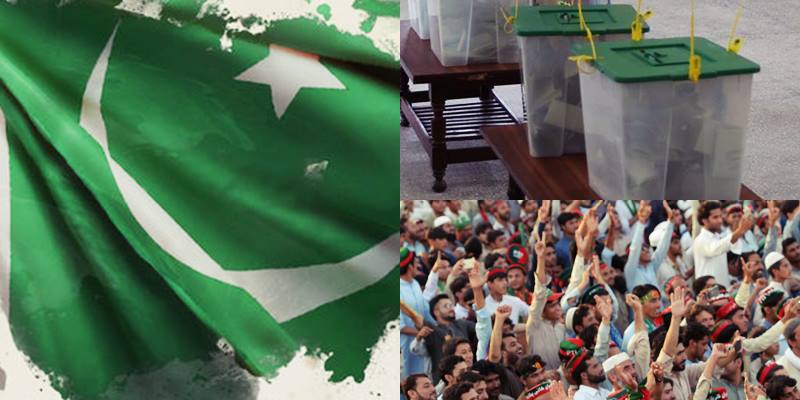Only a democratic dispensation that enjoys people’s mandate will be able to handle the disastrous energy crisis, the spillover of Nato’s exit from Afghanistan and the security and foreign policies
Pakistan’s first rule-based democratic transition is underway. The last time a civilian government oversaw the election process was in 1977 when charges of rigging led to a popular movement, ouster of the civilian government and ultimately a coup. Otherwise it has been one military or quasi-military regime managing the process of elections.
Three institutions are managing this process: Firstly, the Election Commission of Pakistan; secondly, the Judiciary and thirdly the interim governments in centre and the provinces. The role of the president is minimal other than his own party affairs and the military seems to be in the background and largely focusing on the security issues. This is a situation, which ought to be celebrated as we have the basic preconditions in order.
But state incapacity and ideological biases overshadow the ongoing transition. In the past few weeks, the returning offices – senior district judicial officers – have been scrutinizing the candidates in a most ad hoc manner. In their zeal to abide by the constitutional clauses inserted by Gen Zia’s regime – which place a premium on the faith of the candidate and his/her loyalty to an undefined ‘ideology of Pakistan’ – a circus was witnessed.

An unprofessional line of questioning adopted by the ROs marred the initial electoral proceedings. The ECP perhaps did not issue the right standard guidelines and, therefore, left the subordinate judges to exercise their will and the results were not too pleasing. Women were asked how would they manage their children if they became a legislator and others were asked to recite Quranic verses with the right intonations and accent! Ideological shifts of the past three decades were at work here.
Despite the much hyped scrutiny, the issue of corruption – tax evasion, bank defaults etc – were thereby bypassed. And a newspaper the Express Tribune commented as follows: “Not being able to recite Quranic verses became grounds for disqualification but financial impropriety is apparently considered more kosher”. The ECP ought to have trained the ROs and installed some capacity for financial screening.
Judicial populism continued as the Chief Justice of Pakistan, while addressing the ROs, stated: “I may emphasize that you are not performing functions in individual capacity but as representatives of the institution of judiciary. Discharging your functions, as District Returning Officers, Returning Officers and Assistant Returning Officers, you represent all of us, the institution of judiciary as a whole. A single mistake, if committed by any of you, it is likely to bring bad name for the institution of judiciary, which is respected and has earned the trust and confidence of the nation”. The mistakes sadly were many and are being rectified by the appellate tribunals where the aggrieved candidates are getting relief.
A lawyers’ convention held a few days ago highlighted the view of the bar. Asma Jahangir, for instance, stated that courts “should not meddle in the ECP affairs and the CJP “by addressing the Returning Officers wanted to influence the election process”. (Express Tribune, April 7, 2013). Other lawyer leaders such as Abid Saqi also opined that judicial officers were not trained before their appointment as Returning Officers and they had “no right to humiliate the candidates by asking personal questions.”
Overall, Pakistan’s media, despite the primary audience’s (the urbanizing middle class) anathema for elected officials and politicians, did take ROs to task. Eventually, the president issued a statement and the ECP also reigned in the over zealous ROs from exercising injudicious control over the ideological fitness of the candidates.

The most challenging issue, which haunts the forthcoming transition, is that of security and the growing power of non-state actors who have decreed on a de facto ‘eligibility’ of political parties that can contest and succeed in the coming elections. To date, dozens of attacks have taken place on the PPP, the MQM and the ANP’s candidates.
The leadership of these parties is under threat and it is unclear how far public campaigns and canvassing would be possible for these parties. In part, there is an obvious question on the lack of focus by the outgoing federal and provincial governments on law enforcement apparatus. But that is just one side of the complex issue. The larger issue relates to the overall security framework within which Pakistani state operates. Using and letting non-state actors grow as strategic assets is a policy that bedevils our future; and calls for resetting the civil-military imbalance. The latter goal is a long term one and only democratic transitions and incremental increase of the civilian sphere will allow for this to happen.
The net result of the security factor is that parties such as the PML-N, the PTI and the JUI-F are more favoured by Pakistan’s most powerful non-state actors. The controversial caretaker interior minister has talked of threats to Imran Khan and Mian Nawaz Sharif as well. Therefore, the caretaker administrations find themselves handling a worn out security apparatus to ensure that violence is minimised in the country.
Notwithstanding these larger dynamics at work, the political parties are gearing up for the electoral contest. Very soon the tickets for candidates will be announced and a very tight campaign of 30 days or less will lead us to the next Parliament.
The pundits are placing the PML-N at the front of the electoral race with the PPP and other parties trailing behind. The PTI is expected to emerge as a sizeable parliamentary group and the JUI-F and the MQM as the other two groups, which are likely to join the next coalition. The PML-N is in alliance with the Baloch and Sindhi nationalists and in the past few weeks it has worked rather hard to overcome its Punjab-centric identity. While in Sindh it may not make any inroad, in Balochistan its alliance with the Balochistan National Party (Mengal) will yield some dividends for the future federal and provincial governments.

The key battlegrounds are South Punjab and Sindh where the PPP’s fate shall be decided. If it retains its seats then it will be in a position to challenge Nawaz Sharif’s expected sweep in the central Punjab. The new factor in these elections is party-based contest in Fata where once again chances for the PPP and the ANP are limited due to the security climate. The JUI-F is likely to make some gains. The most fragmented results may be seen in Khyber Pakhtunkhwa where the terrorism and chaos during the last five years will impact the outcomes.
The elections are not the end of this process. The next government – most likely a weak coalition of competing interests and ideologies – has the most onerous agenda at hand: dealing with a disastrous energy crisis, the spillover of Nato’s exit from Afghanistan and reclaiming the security and foreign policy. Only a democratic dispensation that enjoys people’s mandate will deliver on these objectives.
This is why a transition that is free of interference, rigging and unwarranted interference by unelected institutions of the state is paramount at this difficult moment of Pakistan’s existence.



